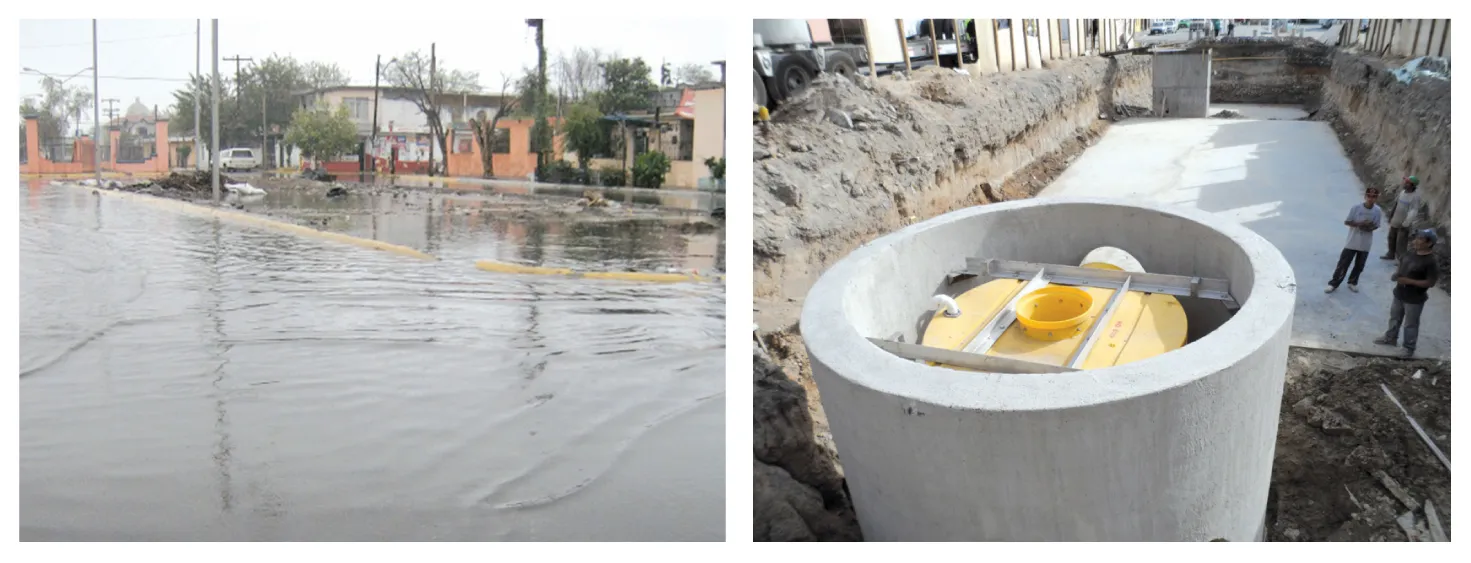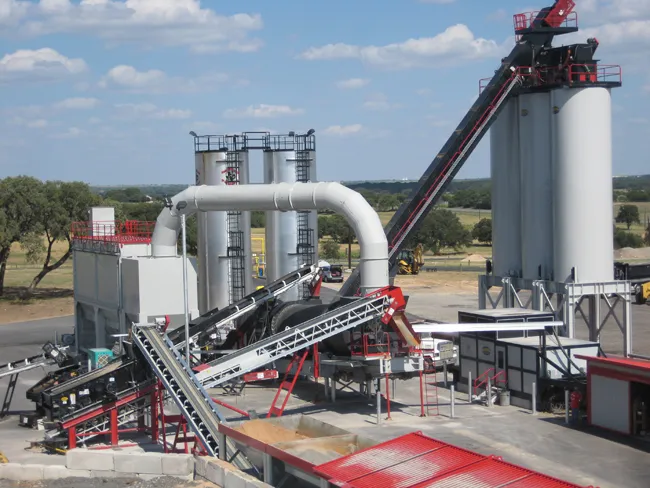A vital and novel highway drainage project in Mexico could provide the key to reducing the nation’s water scarcity, as Guy Woodford reports. A rare highway drainage project in downtown Monterrey, Mexico has created a sustainable blueprint for rainwater re-use that could help to tackle the country’s water scarcity problems.
May 23, 2014
Read time: 4 mins

A vital and novel highway drainage project in Mexico could provide the key to reducing the nation’s water scarcity, as Guy Woodford reports
A rare highway drainage project in downtown Monterrey, Mexico has created a sustainable blueprint for rainwater re-use that could help to tackle the country’s water scarcity problems.
The novel solution pioneered the use of stormwater treatment technologies from1402 HYDRO International in combination with underground storage to recycle rainwater and irrigate street islands in the centre of a wide city centre avenue, supporting a green corridor of 170 oak trees.
The traffic islands are situated in the centre of main Edison Avenue, running along eight blocks and covering 1.5 hectares (3.7 acres) close the city centre. In an ambitious social rehabilitation project, the islands have been transformed from hot-spots of crime and deprivation into a meeting point for the local community including sports facilities and children’s play areas.
With a catchment basin of 540,000m² draining almost 300,000m³ of rainwater, the area was previously prone to heavy flooding and subject to pollution from trash and other floatable debris as well as from hydrocarbons carried in the runoff during storm periods.
Designed and built by Soluciones Hidropluviales of Mexico City, the Edison Avenue project employs a novel concept using Hydro vortex separation technologies to clean runoff upstream of two retention tanks, explains Alberto Burgoa, president and CEO of Soluciones Hidropluviales, who are Hydro’s stormwater product distributors in Mexico.
“The solution we have engineered will store enough water to irrigate the oak trees for 62 days. We hope the technology we developed can not only provide clean water for irrigation projects, but also be used for industrial or other urban regeneration schemes throughout Mexico.”
The new rainwater harvesting solution was retrofitted underneath one of the traffic islands with treatment solutions supplied via Hydro’s US Stormwater Division, headquartered in Portland, Maine, US.
Situated in the northeast of Mexico, with a population of 4 million, Monterrey is the third largest city in Mexico. In the arid northern regions of the country, water scarcity is becoming an increasing problem caused by over-extraction from underground aquifers.
“Using rainwater retention for stormwater management has not been common in Mexico, but we believe it could have great potential as a sustainable solution that can help combat the country’s severe water scarcity problems,” says Burgoa.
A Hydro Downstream Defender vortex separator removes sediment, oils and floatables from the stormwater before it enters the first 186m³ plastic tank designed to regulate the flow and store water. At the outlet to the tank a Hydro Up-Flo Filter provides further high-performance stormwater filtration to remove fine sediments nutrients and metals. Finally the water passes into a 62m² storage tank, from where it is pumped to the drip irrigation system.
“We completed the drainage project in a very short three-month timescale. The Hydro products were quick and simple to install,” says Burgoa. Although the Downstream Defender and Up-Flo Filter typically require once-a-year maintenance, the heavy pollutant load of the drainage area will require more frequent clean-outs.
“The Downstream Defender and Up-Flo Filter will require maintenance twice a year, which is minimal compared to alternative stormwater treatment solutions,” adds Burgoa.
The urban and social regeneration of the Edison district is done by grassroot development and citizen participation. This project is being led by OXXO, the well-known Mexican convenience store chain which has its headquarters in the area. OXXO gathered together a group of investors and sponsors to form The Trust Poligono Edison. The Stormwater solution was supported by FEMSA Foundation as part of its programme in sustainable development of water resources.
The project has seen the islands transformed into a series of family recreation areas including a children’s playground, basketball courts, exercise equipment, ping pong and public fountains. Cultural activities will be organised for the areas 24,000 residents to provide a central community focus and encourage improved social conditions.
A rare highway drainage project in downtown Monterrey, Mexico has created a sustainable blueprint for rainwater re-use that could help to tackle the country’s water scarcity problems.
The novel solution pioneered the use of stormwater treatment technologies from
The traffic islands are situated in the centre of main Edison Avenue, running along eight blocks and covering 1.5 hectares (3.7 acres) close the city centre. In an ambitious social rehabilitation project, the islands have been transformed from hot-spots of crime and deprivation into a meeting point for the local community including sports facilities and children’s play areas.
With a catchment basin of 540,000m² draining almost 300,000m³ of rainwater, the area was previously prone to heavy flooding and subject to pollution from trash and other floatable debris as well as from hydrocarbons carried in the runoff during storm periods.
Designed and built by Soluciones Hidropluviales of Mexico City, the Edison Avenue project employs a novel concept using Hydro vortex separation technologies to clean runoff upstream of two retention tanks, explains Alberto Burgoa, president and CEO of Soluciones Hidropluviales, who are Hydro’s stormwater product distributors in Mexico.
“The solution we have engineered will store enough water to irrigate the oak trees for 62 days. We hope the technology we developed can not only provide clean water for irrigation projects, but also be used for industrial or other urban regeneration schemes throughout Mexico.”
The new rainwater harvesting solution was retrofitted underneath one of the traffic islands with treatment solutions supplied via Hydro’s US Stormwater Division, headquartered in Portland, Maine, US.
Situated in the northeast of Mexico, with a population of 4 million, Monterrey is the third largest city in Mexico. In the arid northern regions of the country, water scarcity is becoming an increasing problem caused by over-extraction from underground aquifers.
“Using rainwater retention for stormwater management has not been common in Mexico, but we believe it could have great potential as a sustainable solution that can help combat the country’s severe water scarcity problems,” says Burgoa.
A Hydro Downstream Defender vortex separator removes sediment, oils and floatables from the stormwater before it enters the first 186m³ plastic tank designed to regulate the flow and store water. At the outlet to the tank a Hydro Up-Flo Filter provides further high-performance stormwater filtration to remove fine sediments nutrients and metals. Finally the water passes into a 62m² storage tank, from where it is pumped to the drip irrigation system.
“We completed the drainage project in a very short three-month timescale. The Hydro products were quick and simple to install,” says Burgoa. Although the Downstream Defender and Up-Flo Filter typically require once-a-year maintenance, the heavy pollutant load of the drainage area will require more frequent clean-outs.
“The Downstream Defender and Up-Flo Filter will require maintenance twice a year, which is minimal compared to alternative stormwater treatment solutions,” adds Burgoa.
The urban and social regeneration of the Edison district is done by grassroot development and citizen participation. This project is being led by OXXO, the well-known Mexican convenience store chain which has its headquarters in the area. OXXO gathered together a group of investors and sponsors to form The Trust Poligono Edison. The Stormwater solution was supported by FEMSA Foundation as part of its programme in sustainable development of water resources.
The project has seen the islands transformed into a series of family recreation areas including a children’s playground, basketball courts, exercise equipment, ping pong and public fountains. Cultural activities will be organised for the areas 24,000 residents to provide a central community focus and encourage improved social conditions.






